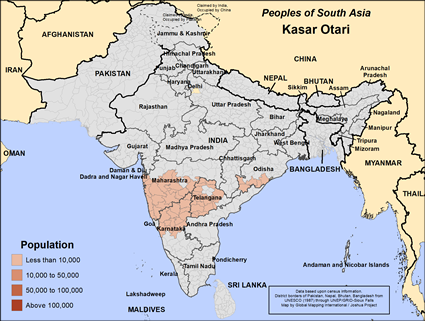Kasar Otari in India

Send Joshua Project a photo
of this people group. |

Map Source:
People Group data: Omid. Map geography: UNESCO / GMI. Map Design: Joshua Project
|
| People Name: | Kasar Otari |
| Country: | India |
| 10/40 Window: | Yes |
| Population: | 24,000 |
| World Population: | 24,000 |
| Primary Language: | Telugu |
| Primary Religion: | Hinduism |
| Christian Adherents: | 0.00 % |
| Evangelicals: | 0.00 % |
| Scripture: | Complete Bible |
| Ministry Resources: | Yes |
| Jesus Film: | Yes |
| Audio Recordings: | Yes |
| People Cluster: | South Asia Hindu - other |
| Affinity Bloc: | South Asian Peoples |
| Progress Level: |
|
Introduction / History
The Kasar Otari of India are part of a larger Kasar group whose traditional occupation is smelting and metal working. They Kasar make toe rings, bangles (rigid bracelets), Hindu idols, bells and musical instruments from brass and copper. The steep rise of the price of copper in recent years has hindered their profession. Copper wire is the main element used in conducting electricity. The Kasar take copper ore and smelt it into pure metal. Then they mix the copper with other metals like zinc and tin to make brass and bronze.
The first language of the Kasars depends where they live. They speak Telugu, Kannada, Odia, and Marathi. Many also speak Hindi, which allows them to conduct business throughout north and central India.
Where Are they Located?
Most Kasar Otari people live in Indian states of Maharashtra, Karnataka and Odisha.
What Are Their Lives Like?
The lifestyle of the Kasar depends upon whether they live in cities or villages. The urban Kasar have lives much like we do in the West. Their children attend secondary schools and often go on to universities. They enjoy the blessings of modern society. The urban Kasar are leaving their old profession as factories and technology can make the metal items they parents made both cheaper and more efficiently.
The Kasar who live in villages live much like their ancestors. They make jewelry, statues and cymbals out of copper and brass using ancient techniques. These items are still used in traditional Hindu rituals and family ceremonies. Many Kasar young people are moving to the cities from the villages.
The Kasar marry within their group. The newly married couple used to live with or near the groom's parents. This tradition is changing and now young Kasars live where they can find employment.
What Are Their Beliefs?
The Kasar Otari practice Hinduism, the ancient religion of India. They worship and serve the gods of the Hindu pantheon. They pay special devotion to Kali, the goddess of death and sex. Hindus believe that by performing rituals and good works that they will attain moksha or freedom from the endless cycle of birth, death and rebirth. The Kasar visit Hindu temples and offer prayers, food, flowers, and incense to their gods in hopes of gaining protection and benefits. They do not have a personal or familial relationship with their gods like Christians or Jews. There are many forms of Hinduism, each with its own deities and beliefs.
The main yearly holidays of the Kasar people are Holi, the festival of colors and the start of spring, Diwali, the festival of lights, Navratri, the celebration of autumn and Rama Navami, Rama's birthday.
What Are Their Needs?
The Kasars who become believers may not be able to make metal items for Hindu rituals. They will need other kinds of employment. The Kasars need to hear and understand the message of Jesus Christ. He alone can forgive their sins and get them right with the one, true God.
Prayer Points
Pray that the Lord moves Indian believers to reach and share the gospel with the Kasar Otari.
Pray the Lord will open the hearts of the Kasar Otari people to desire God's blessings through a movement of family-based discovery Bible studies.
Pray the few believers among the Kasar will grow in sharing and discussing God's Word with their families and communities.